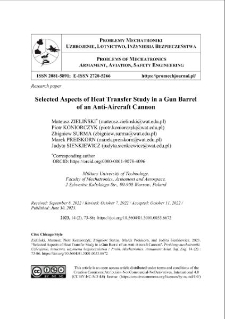Nasza Biblioteka Cyfrowa udostępnia 1 868 obiektów cyfrowych
Obiekt
Tytuł: Selected Aspects of Heat Transfer Study in a Gun Barrel of an Anti-Aircraft Cannon ; Selected Aspects of Heat Transfer Study in a Gun Barrel of an Anti-Aircraft Cannon
Tytuł odmienny:
Wybrane aspekty badania wymiany ciepła w lufie działa przeciwlotniczego ; Wybrane aspekty badania wymiany ciepła w lufie działa przeciwlotniczego
Współtwórca:
Piotr KONIORCZYK, Zbigniew SURMA, Marek PREISKORN, Judyta SIENKIEWICZ ; Piotr KONIORCZYK, Zbigniew SURMA, Marek PREISKORN, Judyta SIENKIEWICZ
Abstrakt:
The paper presents the results of computer simulations of the transient heat flow in the barrel wall of a 35 mm caliber cannon for a single shot and a sequence of seven shots for a selected 30HN2MFA barrel steel. It was assumed that the inner surface of the barrel does not have a protective layer of chromium or nitride. When calculating heat transfer in a barrel, constant and temperature variable values of thermal conductivity, specific heat and density (in the range from RT (Room Temperature) up to 1000℃) in the 30HN2MFA steel were assumed. The test results were compared for both cases. A barrel with a total length of 3150 mm was divided into 6 zones (i = 1,…, 6) and in each of them, the heat flux density was calculated as a function of the time ��̇��(��) on the inner surface of the barrel. In each zone, the heat transfer coefficient, as a function of the time hi(t) and bore gas temperature as a function of the time Tg(t) to the cannon barrel for given ammunition parameters, was developed. A calculating time equaling 100 ms per single shot was assumed. The results of the calculations were obtained using FEM implemented in COMSOL Multiphysics ver. 5.6 software.
;
The paper presents the results of computer simulations of the transient heat flow in the barrel wall of a 35 mm caliber cannon for a single shot and a sequence of seven shots for a selected 30HN2MFA barrel steel. It was assumed that the inner surface of the barrel does not have a protective layer of chromium or nitride. When calculating heat transfer in a barrel, constant and temperature variable values of thermal conductivity, specific heat and density (in the range from RT (Room Temperature) up to 1000℃) in the 30HN2MFA steel were assumed. The test results were compared for both cases. A barrel with a total length of 3150 mm was divided into 6 zones (i = 1,…, 6) and in each of them, the heat flux density was calculated as a function of the time ��̇��(��) on the inner surface of the barrel. In each zone, the heat transfer coefficient, as a function of the time hi(t) and bore gas temperature as a function of the time Tg(t) to the cannon barrel for given ammunition parameters, was developed. A calculating time equaling 100 ms per single shot was assumed. The results of the calculations were obtained using FEM implemented in COMSOL Multiphysics ver. 5.6 software.
Miejsce wydania:
Warszawa
;
Warszawa
Wydawca:
Wojskowa Akademia Techniczna ; Wojskowa Akademia Techniczna
Data utworzenia:
Data złożenia:
Data akceptacji:
Data wydania:
Rozmiar:
Identyfikator:
oai:ribes-88.man.poznan.pl:2674
Sygnatura:
doi:10.5604/01.3001.0053.6672 ; doi:10.5604/01.3001.0053.6672
ISSN elektroniczny:
ISSN drukowany:
Język:
Licencja:
kliknij tutaj, żeby przejść ; kliknij tutaj, żeby przejść
Właściciel praw:
Wojskowa Akademia Techniczna ; Wojskowa Akademia Techniczna
Strona początkowa:
Strona końcowa:
Tom:
Czasopismo:
Słowa kluczowe:
mechanical engineering, anti-aircraft cannon barrel, heat transfer, numerical simulation, temperature field ; mechanical engineering, anti-aircraft cannon barrel, heat transfer, numerical simulation, temperature field
Kolekcje, do których przypisany jest obiekt:
Data ostatniej modyfikacji:
15 paź 2025
Data dodania obiektu:
15 paź 2025
Liczba wyświetleń treści obiektu:
0
Wszystkie dostępne wersje tego obiektu:
https://ribes-88.man.poznan.pl/publication/3007
Wyświetl opis w formacie RDF:
Wyświetl opis w formacie OAI-PMH:
| Nazwa wydania | Data |
|---|---|
| Selected Aspects of Heat Transfer Study in a Gun Barrel of an Anti-Aircraft Cannon | 15 paź 2025 |
Obiekty Podobne
Zbiniew LECIEJEWSKI Andrzej DĘBSKI, Piotr KONIORCZYK, Marek PREISKORN, Zbigniew SURMA, Janusz ZMYWACZYK

